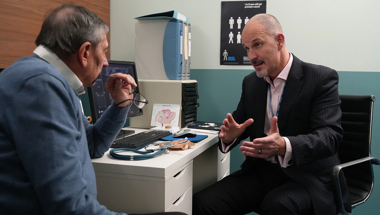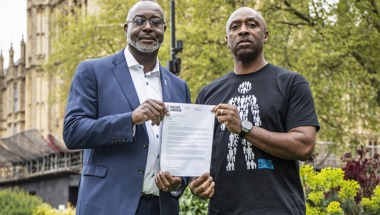Event
16 Jun 2025Towards equity in prostate cancer: leading the conversation at our first health inequalities conference
We recently gathered some of the UK’s leading experts on health inequalities in prostate cancer for our first ever health inequalities conference. Here, conference Chair Dr Abel Tesfai, our Senior Data and Evidence Officer, explains some of the key takeaways from this landmark event.

On 13 March we held Prostate Cancer UK’s first ever health inequalities conference, Towards Equity: Exploring Prostate Cancer Disparities Experienced By Black Men. I was delighted to chair this virtual conference, hosted on the BeThere Global platform, which brought together nine expert speakers on health inequalities in prostate cancer.
Black men are continuing to face stark health inequalities in diagnosis and treatment
When it comes to prostate cancer, men’s outcomes remain profoundly affected by health inequalities – with Black men, in particular, facing a number of disparities.
For example, Black men have double the risk of being diagnosed with prostate cancer compared to other men. In fact, as many as 1 in 4 Black men will get the disease – and 1 in 12 will die from it.
We also know that Black men are more likely to face early-onset and aggressive prostate cancer. It’s been shown that, on average, they’re diagnosed 5.1 years younger than white men.
These inequalities have been deepened further by the fact that Black men have been under-represented in key clinical trials, as well as the issues of under-reporting and misreporting of ethnicity data in healthcare records.
Understanding evidence gaps to drive a shift in policy
To combat this, we need to understand the evidence gaps in the research - and produce new evidence that will help us shift prostate cancer policy. This will be crucial in reducing the stark health inequalities we’re seeing today.
That’s why this conference was so important. It was a key example of our commitment to raising awareness of health inequalities and bringing forward initiatives that will drive real change – like our ongoing campaign calling on the Government to change outdated NHS guidelines that prevent GPs from proactively talking to men at highest risk about prostate cancer.
Our conference set out to explore the causes behind these disparities, with a focus on real-world evidence. It included discussions on the intersectionality of factors such as ethnicity and deprivation, and how these have a combined impact on men’s prostate cancer outcomes.
We had three main goals:
- To showcase our openness towards collaboration and demonstrate the power of real-world evidence in connecting with Black communities
- To bring together leading national and international experts, sharing knowledge and insights with researchers, healthcare professionals and those with an interest in health inequalities and prostate cancer
- To explore gaps in research to drive future progress, starting key conversations and linking to our real-world evidence funding call focused on Black men.
Collaborating with leading experts in prostate cancer health inequalities
We were pleased to welcome a number of expert speakers to the conference, including some of the leading figures in the field. They included:
- Dr Abel Tesfai, Senior Data and Evidence Officer at Prostate Cancer UK
I was delighted to chair the conference, highlighting the worrying trend in the number of men being diagnosed with prostate cancer in England and the continued effect of health inequalities in prostate cancer outcomes – including for Black men and men from less affluent areas. - Dr Tom Cowling, Methodological Lead at the National Prostate Cancer Audit
Our keynote speaker, Dr Cowling presented a summary of the findings from the NPCA’s latest State of the Nation Report, showing disparities in diagnosis and treatment by ethnicity and deprivation. Dr Cowling highlighted that Black men have the most new diagnoses per capita of all ethnic groups and that Black men diagnosed with high risk, locally advanced disease (aged 55 to 70) are less likely to have radical treatment than white men. - Natalia Norori, Senior Data and Evidence Manager at Prostate Cancer UK
Ms Norori outlined how prostate cancer incidence and mortality rates are higher for Black men, and the importance of using real-world evidence from the analysis of routinely collected patient data in reducing this and other health inequalities. - Keith Morgan, Associate Director of Black Health Equity at Prostate Cancer UK
Mr Morgan outlined our commitment to collaborative approaches to building trust among Black communities, highlighting our campaign to change outdated NHS guidelines and showcasing recent examples of impactful community engagement.
- Professor Habib Naqvi MBE, Chief Executive of the NHS Race & Health Observatory
Prof Naqvi highlighted the importance of deepening collective efforts to uncover the ‘causes of the causes’ behind ethnic inequalities. He drew attention to the role of rebuilding trust in a post-pandemic world, driving policy change with an evidence-based approach, and demonstrating leadership change by naming racism. - Dr Edward ‘Chris’ Dee, Global Oncology and Health Services Researcher at the Memorial Sloan Kettering Cancer Center
Dr Dee presented insights from the US and the UK, pinpointing ethnic disparities in prostate cancer - from PSA levels, screening, care in localised settings and outcomes in the metastasised setting - as well as discussing the influence of socio-cultural beliefs. He ended with his five key lessons to promote health equity.
We also had expert discussions guided by a panel which included Dr Cowling, Prof Naqvi and Dr Dee as well as Amy Rylance (Assistant Director of Health Improvement at Prostate Cancer UK) and Consultant Urologists Prof Frank Chinegwundoh MBE and Mr Jon Aning.
Learning from clinicians and scientists who identify with communities most affected by these disparities helped to clarify next steps in research, clinical care and cancer policy in the UK, with implications and insights for the rest of the world as well.
What happens next? Our real-world evidence funding call
The conference coincided with our real-world evidence funding call, which aims to fill evidence gaps for Black men in terms of the diagnosis and treatment of prostate cancer. This multi-step process began with the announcement of the funding call in January, with awards due to be made this summer.
Our Data and Evidence team has also been collaborating with colleagues from our Black Health Equity team to target campaign materials and awareness messaging towards Black men. In addition, we’re supporting with the development of a new Black health equity strategy, which aims to reduce health inequalities by leveraging our existing connections with Black communities.
Alongside this work, we’re collaborating with key stakeholders – such as the National Disease Registration Service team driving the Get Data Out programme – to continue pushing for disaggregated data. This would ensure prostate cancer outcomes for men from ethnic minority groups can help shape future research questions and policies. This has already helped lead to the publication of data sets on sub-populations.
Towards a deeper understanding of health inequalities
Our conference was a true collaborative effort, which wouldn’t have been possible without our brilliant speakers and the dedication of many colleagues at Prostate Cancer UK.
We’re grateful to all those who attended the conference - despite the challenging backdrop of the Government’s recent announcement regarding changes to NHS England.
The feedback we received was overwhelmingly positive, with 94 per cent of attendees saying they found the conference useful and three quarters agreeing that it deepened their understanding of ethnic disparities in prostate cancer.
Interested in prostate cancer health inequalities and want to catch up on our conference? If you weren’t able to attend, you can register to watch recordings from the conference until Saturday 13 September.






